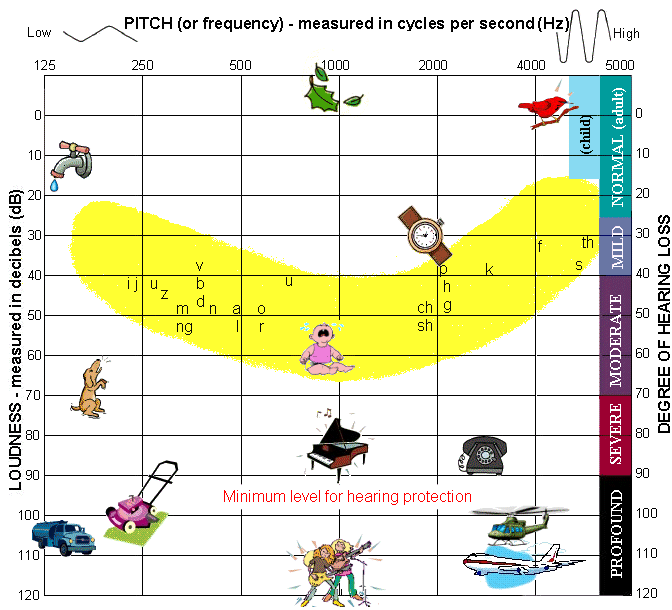Hearing loss is not the same for everybody. For individuals with any degree of hearing loss, it can be very difficult trying to explain their loss. Some find that their friends and family with “normal” hearing just don’t get what it’s like to have a hearing impairment. Enter the “Speech Banana”.
A wonderful visual tool called the “speech banana” can help the hearing world understand what individuals are hearing or not hearing. It is based on the audiogram chart one receives after a hearing test. Sounds we use to produce everyday speech have frequencies (pitch) and decibels (loudness). The different loudness levels and pitches of where the speech sounds fall on the audiogram can be seen in a banana-shaped pattern, which is why it is referred to as a “speech banana”. Almost all of the entire alphabet and letter combinations (ex. ch, sh, th, and ng) fall into the speech banana range on an audiogram.
Individuals with good hearing can hear lots of sounds outside the banana such as high frequency of birds chirping or low frequency of bass drum. However, hearing loss often strikes the speech banana area, resulting in individuals having trouble hearing and understanding speech.
For example: an individual who has moderate hearing loss and has lost their ability to hear high frequency sounds of 4000 Hz and greater will find words that are spoken to them using “f”, “th”, and “s” difficult to understand. These words could include: “thirsty”, “first”, “months”, etc.
Watch this video by the House Research Institute to hear it with your own ears now. It demonstrates hearing loss and what it is like at various severity levels while pairing it with the audiogram and speech banana. LEAVE the volume alone as you listen to the video.
If you or someone you know has a concern with hearing loss, we recommend speaking to a hearing care professional. In addition to hearing aids, there are other amplified assistive technology devices that we at Assistive can help identify to help lessen the impact of hearing loss. Contact us at 800-895-4728 or www.ndassistive.org.

